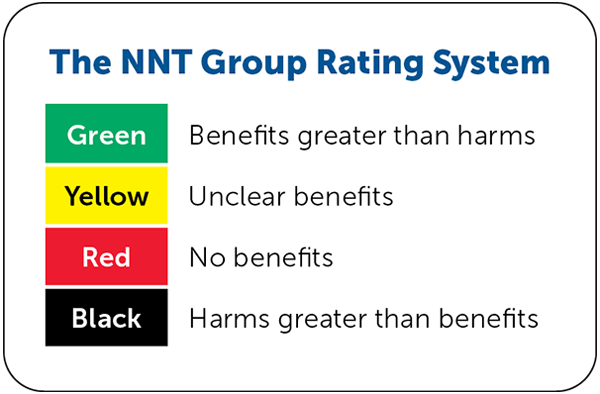
Am Fam Physician. 2023;107(2):131-132
Author disclosure: No relevant financial relationships.

Details for This Review
Study Population: 1,343 adults in 10 randomized controlled trials who have cancer (any stage) or are receiving palliative care (any terminal disease)
Efficacy End Points: Laxation response
Harm End Points: Effect on analgesia and adverse events

| Green | Benefits greater than harms |
| Yellow | Unclear benefits |
| Red | No benefits |
| Black | Harms greater than benefits |
Narrative: Opioids are often used to manage moderate to severe pain in patients with cancer and patients with or without cancer receiving palliative care. The benefit of opioid analgesics occurs through binding to mu-, kappa-, and delta-opioid receptors. Activation of mu-opioid receptors in the wall of the gut leads to disruption of gastrointestinal propulsive motility, causing decreased peristalsis, delayed gastric emptying, and ultimately opioid-induced bowel dysfunction, a significant adverse effect of opioid use.1
Opioid-induced bowel dysfunction is a change in baseline bowel habits characterized by decreased frequency of bowel movements (less than three per week), increased straining to pass bowel movements, or the inability to complete rectal evacuation.2 Patients may also experience nausea, emesis, bloating, abdominal cramping, gastric reflux, and abdominal distention. These symptoms can cause psychological distress, agitation, and increased morbidity for patients with cancer and those receiving palliative care.
A comprehensive regimen to decrease constipation in patients with opioid-induced bowel dysfunction commonly includes a laxative stimulant, stool softeners, and continuing general laxation measures. However, despite these interventions, more than 80% of patients with opioid-induced bowel dysfunction continue to experience constipation, 33% change their pain medication regimen, and 92% of those who changed medications subsequently experience increased pain. 3 Mu-opioid antagonists bind to mu-opioid receptors in the wall of the gut and neutralize the constipating effect of opioids. Mu-opioid antagonists are commonly used as laxation augmentation or as an alternative when laxatives fail.4
A systematic review of 10 randomized controlled trials evaluated the benefits of mu-opioid antagonists on laxation response, effect on analgesia, and adverse events in 1,343 adults with cancer or those receiving palliative care with or without cancer.5 Mu-opioid antagonists included oral naldemedine (Symproic) or subcutaneous methylnaltrexone (Relistor). The randomized controlled trials compared mu-opioid antagonists with placebo, at different doses, or in combination with laxative medications.
Patients taking oral naldemedine had a greater than threefold increase in spontaneous laxation at two weeks compared with placebo (risk ratio [RR] = 2.0; 95% CI, 1.59 to 2.52; absolute risk difference [ARD] = 35%; number needed to treat [NNT] = 3; moderate-certainty evidence). Naldemedine had little to no effect on analgesia and did not increase the risk of serious adverse events. The risk of nonserious adverse events (most commonly diarrhea) was higher for naldemedine compared with placebo (RR = 1.49; 95% CI, 1.19 to 1.87; ARD = 17%; number needed to harm = 6; moderate-certainty evidence). Higher doses of naldemedine may be associated with an increased rate of spontaneous laxation in the medium term (0.1 mg vs. 0.4 mg; RR = 0.69; 95% CI, 0.53 to 0.89; ARD = 25%; NNT = 4; low-certainty evidence).
The rate of spontaneous laxation was four times greater at 24 hours with subcutaneous methylnaltrexone than placebo (RR = 2.97; 95% CI, 2.13 to 4.13; ARD = 45%; NNT = 3) and 10 times greater at two weeks (RR = 8.15; 95% CI, 4.76 to 13.95; ARD = 65%; NNT = 2; moderate-certainty evidence). Although subcutaneous methylnaltrexone had a higher overall risk of adverse events compared with placebo (RR = 0.59; 95% CI, 0.38 to 0.93; ARD = 10%; number needed to harm = 10; low-certainty evidence), it reduced the risk of opioid withdrawal symptoms and did not increase the risk of serious adverse events.
Caveats: The Grading of Recommendations Assessment, Development, and Evaluation (GRADE) rating of the evidence for the use of oral naldemedine and subcutaneous methylnaltrexone for opioid-induced bowel dysfunction was evaluated as moderate certainty; however, the evidence for adverse events was considered low certainty. Although naldemedine and methylnaltrexone demonstrated laxation benefits, studies had significant heterogeneity in comparison and delivery of mu-opioid antagonists, reporting of adverse events, and timing of follow-up. Eight of the 10 trials were industry sponsored.
The American Gastroenterological Association Institute guidelines for patients with opioid-induced constipation recommend traditiona l laxatives as first-line therapy. If laxatives do not provide an adequate laxation response, escalation of therapy to naldemedine is recommended, with methylnaltrexone following as a conditional recommendation.6 Additional controlled studies with a focused evaluation of treatment benefits and potential adverse events over a longer follow-up period are needed.
Conclusion: The systematic review found that oral naldemedine improves opioid-induced bowel dysfunction over two weeks in patients with cancer, and subcutaneous methylnaltrexone improves opioid-induced bowel dysfunction over two weeks in patients receiving palliative care. We have assigned a color recommendation of green (benefits greater than harms) for the use of oral naldemedine and subcutaneous methylnaltrexone in these patients.
